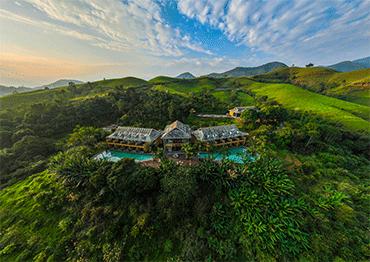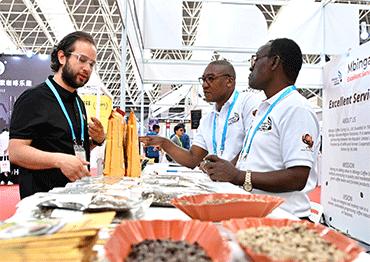offee consumers tasted a bitter storm in their cups in 2024. Beans were trading at their highest level in December 2024 since 1977 due to extreme rainfall and droughts in the world’s two biggest producers, Brazil for Arabica and Vietnam for Robusta beans. Although prices slipped a bit recently, analysts expect high prices to continue in 2025, including the sustained impact of last year’s bad weather in Brazil and Vietnam and higher tariffs imposed by the US.
In China, coffee has become a very popular beverage, particularly among young consumers. Several major international and local brands, including Starbucks, Nestlé and Luckin, use coffee beans from Southwest China’s Yunnan Province, which has long been known for its tea and flower industries. Yunnan produces more than 98 percent of coffee beans in China, according to the provincial agriculture and rural affairs department, with output in 2024 totaling 150,000 tons. Customs data shows that Yunnan exported 32,500 tons of coffee in 2024 to 29 countries and regions around the world, including the Netherlands, Germany and the US, a staggering 358 percent year-on-year increase.
Coffee was introduced to Yunnan in the late 19th century, but large-scale plantations did not start until the mid20th century. The main variety is Catimor, a hybrid of Arabica and Robusta. It is known as Xiaoli (small grain) in Yunnan. Since 2022, local specialty coffee varieties called Yunka (Yunnan coffee), which feature distinctive fruit or floral aromas, have been developed based on Catimor.
In an interview with China News Service, He Feifei, associate professor at the School of Agriculture, Yunnan University and executive director of the non-profit organization Specialty Coffee Society of Yunnan, shares her views on the history and development of the coffee industry and culture in the region.
China News Service: How was coffee introduced to Yunnan? And how did this southwestern province become a world-leading coffee producer?
He Feifei: Coffee is a hugely popular drink across the world, but the coffee tree is generally believed to have originated in Ethiopia, and it then spread to other continents due to colonial expansion, cross-border trade and personnel flows. In 1884, coffee tree seedlings were brought to China’s Taiwan region by British traders, before they were introduced and planted in Yunnan’s Ruili and Binchuan, Hainan Province’s Wenchang, Fujian Province’s Xiamen and other places. Among the several versions of Yunnan coffee’s origin story, the academic community tends to favor the record (kept at a national coffee germplasm bank in Ruili) that residents of the Jingpo ethnic group in the border area of Ruili first cultivated coffee that was brought from Myanmar in 1893. (A widely circulated version is that French missionary Alfred Liétard, whose Chinese name is Tian Deneng, brought seeds from Vietnam and planted Yunnan’s first coffee tree in Zhukula Village in Lijiang in 1892 or 1904.)
China’s coffee industry started in the 1950s. In 1952, returning overseas Chinese from Malaysia set up a collective farm for coffee cultivation in Xinglong on Hainan Island. The same year, in Yunnan, experts from the Institute of Tropical and Subtropical Cash Crops under the Yunnan Academy of Agricultural Sciences brought coffee from the border area of Dehong to Mang City, half of which was introduced to Lujiangba in Baoshan City, and gradually started coffee cultivation on a large scale. In 1958, Baoshan Arabica coffee made its way to the London market and was rated as a “first-class product.” In 2023, China overtook the US as the country with the most branded coffee shops in the world. From 2010 to 2022, China’s annual per capita coffee consumption tripled to 0.5 kilograms per person (according to the International Coffee Organization).
Both located on high plateaus, Yunnan and Ethiopia share diverse and vertical climate conditions, making them among the most ideal regions for coffee cultivation on the planet. In the early 1990s, Nestlé launched a coffee plantation program in Yunnan, becoming one of the first foreign companies to enter China after the country’s reform and opening-up (which started in the late 1970s).
With proactive support from the provincial government, Yunnan’s coffee industry has grown rapidly, with the emergence of multiple leading enterprises and brands in coffee planting and processing in China. In 2023, Yunnan’s coffee planting area and output both accounted for more than 98 percent of the national total. Over recent years, as Yunnan seeks to develop specialty coffee, many of its coffee beans have been clinching awards in international competitions, making this production region increasingly known to the world.
CNS: As one of the world’s major beverages, coffee is more than just a commodity. What role does it play in cultural exchanges and personnel flows?
HF: The circulation of coffee has obviously promoted cultural exchanges and personnel mobility across borders. It has a long industrial chain that stretches from planting, processing, roasting, packaging and brewing, to sales, branding and so on. As the coffee flows, so do workers, technical standards and development ideas along the whole industrial chain. For example, after spreading to Yemen, the Ethiopia-originating Arabica coffee took on a deep chocolatey flavor, due to the region’s diverse cultivation environment, arid climate and post-harvest exposure to sunlight. Since the Yemeni port of Mocha was an important commercial port on the Red Sea, businesspeople traveling to and from the port named this coffee after the Yemeni port, which is now often used to refer to a latte drink with chocolate sauce.
For example, professional bean hunters have emerged in the coffee industry, who travel across the world’s coffee bean producing regions and coffee plantations in search of high quality beans. Chinese coffee chain Luckin launched a “Global Bean Hunting Initiative,” organizing visits to the world’s three renowned producers: Ethiopia, Panama and Indonesia, as well as a visit to Yunnan in March 2024. Here, coffee serves as a medium of cultural exchange, promoting cultures and customs across countries and regions.
Not only that, cafes are a place for socializing. Caffè Greco in Rome, which hosted Charles Dickens and Mark Twain, among other literary giants, is a must-visit for tourists.
Therefore, industrialized development and circulation of coffee has not only brought strong impetus to economic development, but also formed a unique coffee culture around the world, as well as promoting exchanges and mutual learning between peoples.
CNS: How has China’s coffee culture evolved over the years?
HF: I have relatives who grow coffee in Lujiangba, Baoshan City, one of the major coffee-producing areas in Yunnan. When I visited in the early 1990s, those who drank coffee did not use coffee utensils. They simply put ground coffee into boiling water and brewed it intuitively, with no idea about brew ratio and brew time. They used gauze for a filter. Although it smelled good when it was brewing, it tasted bitter, so a lot of sugar had to be added. In those days, China’s coffee farmers grew coffee only to sell beans, and did not have the habit of drinking coffee.
The formation and development of China’s coffee culture is closely related to the rise of China’s economy. In the 1980s, Nestlé introduced Nescafé 1+2 instant coffee sachets in China, which marked the beginning of modern China’s coffee market, as well as many Chinese people’s awareness of the beverage. Since the start of the 21st century, with China’s burgeoning economy and rising standard of living, instant coffee could no longer satisfy consumers’ growing demand for coffee quality, as they began to consciously pursue better tasting coffee.
Thanks to the region’s superior natural conditions, Yunnan coffee is characterized by its distinctive complex flavor of being full-bodied yet not bitter, aromatic yet not overpowering, with a subtle fruity acidity. With strong encouragement from the government, Yunnan has embarked on the path of developing specialty coffee, with standard production processes applied across the entire chain, from cultivation to processing. It is fair to say that out of China’s coffee producing areas, Yunnan is the one that has the most complete industrial chain and pretty solid development.
Interestingly, China’s coffee culture varies greatly in different production and consumption areas. In Yunnan, most coffee-producing areas are home to ethnic groups, which boast rich and colorful cultures, and have artfully integrated coffee into daily life. We can drink coffee in a Dai ethnic group’s bamboo hut, buy coffee in flower and vegetable markets, eat specialty dishes made from coffee leaves and flowers, and enjoy creative coffee with local delicacies such as black truffles and ru shan (a type of rolled fried cheese made from whey.
In its main consumption areas – cities, a wide variety of trendy and sophisticated independent coffee shops have become icons of urban life. There is an array of coffee shops offering co-branded products and developing “new Chinese-style” coffee made with traditional ingredients such as tea and soy milk. From all these cultural expressions of coffee in China, it is clear that Chinese people have, through their traditional approach of openness and inclusiveness, breathed new vitality into coffee and its culture, endowing them with a unique brilliance.
CNS: What are the trends of China’s coffee industry and coffee culture, and how will this influence Africa and the world’s coffee industry?
HF: First of all, China brings a huge global coffee consumption market. China’s coffee market totaled around 265.4 billion yuan (US$36.3b) in 2023, with a compound annual growth rate of 17.14 percent over the past three years. The market was expected to hit 313.3 billion yuan (US$42.9b) by the end of 2024.
Many overseas coffee-producing countries place high value on the Chinese market. Brazil, for instance, exported 422,000 bags of coffee to China in 2022, and this number surged to 1.5 million in 2023, an unprecedented growth for the Brazilian coffee industry.
At the same time, China’s coffee industry is enjoying prosperous development in its drive to develop specialty coffee, with every segment of the industrial chain moving toward standardization and refinement, while becoming increasingly competitive on the global scene.
Against this backdrop, it is a mutually beneficial and a win-win choice to cooperate with overseas coffee production areas. Africa, for example, boasts rich coffee germplasm resources, and it is in need of a broad consumer market.
Currently, I am participating in a project jointly conducted by China and Ethiopia on coffee weather index insurance product design, preference analysis and policy effect evaluation, and the research results will benefit both countries.
Yunnan could carry out germplasm resource cooperation with other coffee producing regions, develop coffee varieties with better traits and help promote sustainable development for the global coffee industry.

 Old Version
Old Version



